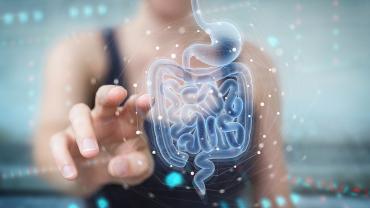
Chronic intestinal inflammation is a major driver of colorectal cancers and inflammatory bowel disease. Unresolved inflammation local to the GI tract is significantly influenced by and associated with the health and composition of the gut microbiome. It is well-evidenced in the scientific literature that probiotics, prebiotics, and newly termed “postbiotics” (e.g., short-chain fatty acids (SCFAs) such as butyrate) “can have direct immunomodulatory and clinically relevant effects” that may “improve overall health and [help] relieve symptoms in a range of diseases” such as irritable bowel syndrome, obesity, metabolic syndrome, and NAFLD.
How bile may support the immune system
According to a recent study published in the journal Nature, “products of microbial fermentation including butyrate facilitate the generation of peripherally induced Treg (pTreg) cells, indicating that metabolites shape the composition of the colonic immune cell population.” Peripheral T-regulatory cells, specifically immunosuppressive CD4+ Treg cells, are necessary for optimal intestinal health as they help dampen inflammatory responses within the gut. Researchers explored crosstalk between commensal gut microbiota and host immune system and found that Treg cells (which not only mature in the thymus but also in intestinal tissue) shielded the “good” intestinal bacteria from immune invasion.
A portion of the bile excreted into the small intestine, for the purpose of dietary fat emulsification, is metabolized by commensal gut bacteria. As such, researchers investigated whether bile composition influences the intestinal immunological environment. They discovered two host-derived deconjugated bile acid microbial metabolites that generate a complex of steroid molecules capable of significantly increasing conversion of precursor T cells into pTregs, thus boosting the local production of immune cells in the colon. A metabolite of bile acid, 3beta-hydroxydeoxycholic acid (isoDCA), abundant in the human intestine, was shown to enhance the activity of Foxp3, which suppresses dendritic cells’ immunostimulatory gene expression, and instead promoted anti-inflammatory actions of pTreg immune cells residing in the colon.
Clinical applications
Because the microbial environment within the human GI tract significantly impacts immune health, it is important to support and foster a healthy gut microbiome through nutrition and supplementation. Unfortunately, the standard American and Western diets lack sufficient amounts of dietary fiber and traditionally-fermented foods such as kimchi, sauerkraut, and kefir that help nourish and feed the gut microbiome. Furthermore, Westernized diets are also low in foods that help stimulate bile acid production (aka cholagogues), such as dandelion greens, milk thistle, beetroot, and other bitter greens. A lack of bile production and/or secretion and gut dysbiosis may ultimately enhance pro-inflammatory immune responses within the GI tract.
For these reasons, it is critical that patients shift dietary habits to include more prebiotic fibers (e.g., sunchoke, chicory, green-tipped banana, onion, asparagus, leafy greens) and fermented foods and supplement with probiotics to help balance the composition of their intestinal flora. Many individuals with inadequate dietary fiber intake may suffer from SCFA deficiency, which is the primary fuel source for the colonocytes and has been shown to suppress intestinal inflammation and proliferation of colorectal cancer in research. In these cases, it may be necessary for patients to supplement with exogenous butyrate (a major SCFA produced during gut-flora mediated fermentation of fiber) until endogenous levels reach adequate levels (testable via a comprehensive stool analysis). For those with poor gallbladder or liver function, exogenous bile acid such as ox bile supplementation may help support overall digestion and immune health, in addition to increasing intake of foods that support bile production and secretion.
By Caitlin Higgins, MS, CNS, LDN